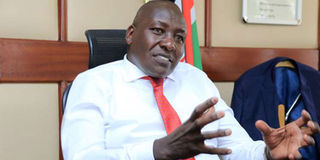To beat dry spell, sell your cattle now, restock when the rains come

Livestock Principal Secretary Andrew Tuimur. He gives an insight to farmers on coping with the dry season and the best measures to save them and their livestock. PHOTO | JEFF ANGOTE | NATION MEDIA GROUP
What you need to know:
- Those animals which can reach Kenya Meat Commission are taken there, but we slaughter the weaker ones and give them to schools and dispensaries.
- The earliest we can see rain is April. Our advice to farmers is that they sell as many animals as they can so that they can restock later.
- We have included milk as part of our strategic food reserve programme. We are buying milk and we shall soon be buying fish to enhance the strategic grain reserve.
- We are also moving into branding according to counties to improve traceability of animals and curb rustling. A lot of leather is exported illegally.
Livestock Principal Secretary ANDREW TUIMUR breaks down what farmers should do in the wake of drought and outlines measures taken to save them and their animals. He spoke to Julius Sigei
Did this drought take the ministry by surprise?
No, we knew about it by last October.
The Meteorological Department had told us that weather won’t be very good and we began talking to Treasury for funding.
Then we formed an inter-ministerial committee to look at various mitigation measures.
We identified food supplements like hay and concentrates on which we have so far spent Sh220 million.
We allocated Sh230 million into uptake, which is now ongoing in most of the hardest-hit areas.
Those animals which can reach Kenya Meat Commission are taken there, but we slaughter the weaker ones and give them to schools and dispensaries.
We buy the animals at an average of Sh20,000 a head. We are putting in another Sh650 million as off-take, now our major intervention.
We have also spent Sh200 million on vaccines. Livestock is big business. It contributes more than 15 per cent of GDP. We need to protect it.
What advice do you give livestock farmers as they wait for the long rains which might delay?
The earliest we can see rain is April. Our advice to farmers is that they sell as many animals as they can so that they can restock later.
Farmers should always try to keep reserve fodder.
Then they need to embrace livestock insurance.
We started it in Wajir and Turkana and it is doing well.
We now want to roll it out in all the 14 arid counties. But the government can’t do everything.
We advise farmers to sell some of the animals and use the money to insure the remaining ones.
Zero-grazers, who produce much of the milk, are also feeling the heat of the dry spell. What is the government doing to help them?
They are not as badly hit as the others as they are mainly in high potential areas.
These group of farmers usually keep silage and hay. We have waived value added tax on animal feeds to make them affordable.
Then we have included milk as part of our strategic food reserve programme. We are buying milk and we shall soon be buying fish to enhance the strategic grain reserve.
Buying milk in this manner will stabilise its prices. This helps solve the perennial problem of throw-away prices when there is milk glut.
The use of irrigation to produce food and feeds remains low, and this may be because of the high cost of equipment.
Why can’t the government subsidise the cost of irrigation kits to boost uptake as it is done in other countries such as India?
During his recent visit to India, President Kenyatta secured a deal to import irrigation equipment a bit more cheaply.
The government also dropped tax on irrigation equipment to make them a bit more affordable.
What stops Kenya from fully exploiting the expanding beef market in the region and the world?
Our beef is very high quality but the biggest hindrance to the marketability of our products is diseases. This has been worsened by the devolution of disease control to the counties.
We fear some of them may not be vaccinating animals aggressively. Diseases that had been wiped out are gripping back. Rinderpest, anthrax, and rabies are now common. Foot and mouth disease is also now endemic.
We need to control these diseases so as to access the European market.
A Livestock marketing board has been gazetted and it is soon getting down to work.
The other area we still score lowly is the leather industry. What steps has the government taken to ensure we have tanneries?
Leather is big business and we are making progress to tap into it.
I recently toured Italy with Industrialisation CS Aden Mohammed and picked the best practices. A leather factory is coming up in Embakasi and we will open it soon.
We are also moving into branding according to counties to improve traceability of animals and curb rustling. A lot of leather is exported illegally.
I hear the price of a raw donkey skin is Sh3,000 and when it reaches China, it is several times higher.
We can make more money when we add value to our leather.





